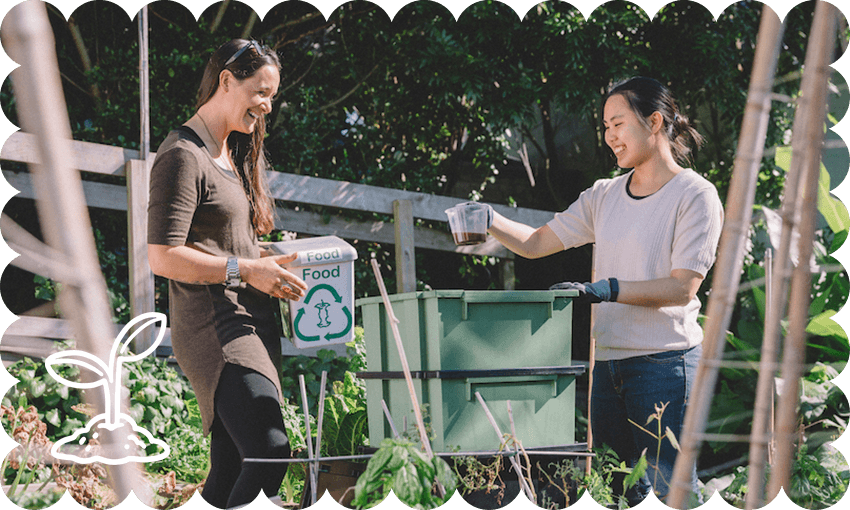Composting is one of the best ways to keep food scraps out of the landfill, and nourish our soil – but there’s an art to good composting. Olivia Sisson asks the Auckland Council Compost Collective all our burning compost questions.
When I first tried composting, I thought it would be cottagecore. Cute, even. I got a compost tumbler and filled it with food scraps. Within a few months I’d made steaming, stinking sludge. Not a good result.
At the same time, I kept getting ads for Lomi – a Silicon Valley style, benchtop composting system. It’s a sleek set-up, the size of a toaster but twenty times more expensive.
When food scraps end up in landfill, the nutrients they contain are lost to our food system, to our soils and to us. Pretty sad, especially when you consider the soaring cost of food here, the serious cyclone crop losses and the depletion of our soils as a result of intensive agriculture. Worse still, food scraps squished in landfill break down anaerobically (without oxygen), which means they emit methane rather than carbon dioxide. Methane traps 25% more heat in the atmosphere.
So how to avoid these bad outcomes? Composting is a great option. And as Judy Keats and Pip Beagley know, it doesn’t have to be hard, expensive or even smelly. They’re part of The Compost Collective in Tāmaki Makaurau. Here are their top tips on how to compost like a pro, whether you’re in a high rise or on a lifestyle block…
Why should I compost?
It’s an environmental thing. If you’re concerned for our planet this is something you can do to help. And it has a bigger impact than you might think. Around 45% of the average Auckland bin is food waste. Plus, if you keep food scraps out of your bin you won’t need to put it out as often and it’ll be less smelly.
But won’t the compost smell?
Nope. If you put the right ratio of green to brown waste in your compost, it won’t smell.
What is brown waste?
Most people are familiar with green waste. It’s your food scraps and fresh grass/garden clippings. Brown waste on the other hand includes things like cardboard, paper and leaves. People often forget to add brown components and they end up with stinky sludge. Brown waste creates surface area and air pockets ensuring the greens can break down aerobically – with oxygen and without bad smells.
Can I put meat in my compost?
What you can and can’t put in your compost depends on the type of composting system you have.
What are the different composting systems?
There are lots of flash systems like big tumblers and tech-smart countertop systems. But there are three low-cost, low-effort systems that The Compost Collective recommends; a classic compost bin, a Bokashi system, and a worm farm.
Which composting system is right for me?
It really depends on your home environment. If you have outdoor space, a compost bin will do the trick. It’s a pretty hands-off operation. Just pop it in a sunny spot, preferably on soil, maybe in the corner of your veggie patch, and then start adding brown and green waste to it. A 50/50 ratio will work, but 70/30 is preferred. Brown waste is harder to come by. Save cardboard from the supermarket if you can. And keep a bag in the car to gather leaves in autumn, they’re free brown waste.
What can I do with my compost?
With a compost bin, you don’t really have to “do” anything. They’re open on the bottom so the nutrients will start leaching into your soil and nourishing your garden right away. You can also add a handful of homemade compost to new plantings to give them a nutrient boost. While you can buy compost at garden stores, compost made at home is better quality.
How’s that?
At home you add to your compost bin bit by bit. It heats up and breaks down slowly over time. Commercially made compost is heat treated and this process destroys the microbial life in the organic matter. It kills the tiny helpers that hold moisture and share nutrients with plants when added to your garden.
Are rodents a worry?
With outdoor compost bins, yes, but there are some simple strategies to keep them away. Cover the bottom of your compost bin with chicken wire. Don’t put meat or cooked food in your compost and be sure to keep it damp. Soak cardboard and leaves before adding. This will keep your compost happy and discourage rodents who like dry nests. Give your compost a few pokes with a pitchfork every now and then, too.
What if I don’t have space outside for a compost bin?
You can use the Bokashi system. It’s a small, airtight bucket system that can be kept inside. This system can take any and all food scraps including meat and cooked foods and it doesn’t require brown waste. You simply add your food waste to the bucket, top it with a microbial sprinkle to aid decomposition and wait. You’ll end up with two end products, a liquid and a solid. These can be sprinkled over and dug into garden beds, or pot plants, to give them a productivity boost.
What if I have no outdoor area, no plants, or can’t be bothered composting?
You can still get amongst. There are other homes for your food scraps. You can drop them off at a local hub. In Auckland there’s one on Federal Street, for example. And there is also a dating app for food waste.
A dating app for food waste?
Well, sort of. ShareWaste is an app where you sign up as a donor – someone who has food scraps – or as a composter. You can organise a composter to come take away your food scraps and turn them into nutrient dense compost for farms and market gardens. All of these efforts help keep valuable nutrients in our food system and out of landfill.
Where can I get a compost bin or Bokashi system?
If you’re ready to get started, join a Compost Collective workshop, either in-person or on Zoom. These are free and will help you suss out which system will work best for your household. Auckland residents who attend get a discount code to purchase a system. With the discount, a compost bin costs less than twenty bucks.


